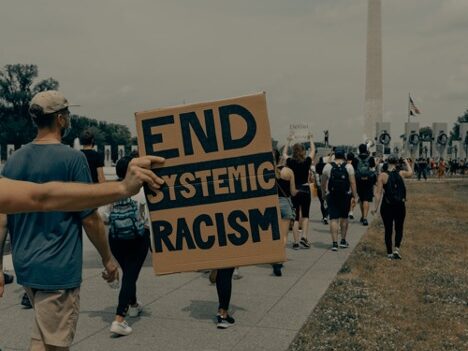In 2020, many white faith-based, as well as white secular, communities discovered – with the death of George Floyd — that racism still existed and operated with severity and impunity.

Tom Adams
See our Resource Pages for additional information on each topic.

In 2020, many white faith-based, as well as white secular, communities discovered – with the death of George Floyd — that racism still existed and operated with severity and impunity.

This week I am continuing to explore concrete recommendations from author Eric Deggans about daily actions that advance our commitment to be anti-racist. In his article Not Racist is not Enough: Putting in the Work to be Anti-Racist, the first tip is about “accepting that we’ve all been raised in a society that elevates white culture over others.” In last week’s post, I looked at how we each might conduct a racial justice self-examination to advance our awareness and motivate personal change.

In last week’s post, I invited readers to share what they have learned about working for racial justice in the nearly two years since George Floyd was murdered. I shared some resources which I have found helpful, including an NPR podcast/article by Eric Deggans. In his article, “Not Racist is not Enough: Putting in the Work to be Anti-Racist,” Deggans is very concrete. He offers four practical tips below that I’ll explore in this and future posts:

We will soon reach the 2nd anniversary of the heinous murder of George Floyd. This murder was so ugly and wrong that even white folks noticed – at least some of us did. Somehow, we had been able to overlook countless atrocious murders of Black and Brown and Native peoples for years, even generations. In last week’s post, Tim Leadem reminded us about the atrocious deaths at the Canadian Training Schools, operated by the Catholic Church.

In May 2021, the remains of 215 children were discovered on the grounds of a former residential school near Kamloops, British Columbia. The gruesome discovery shocked many Canadians and confirmed what many indigenous leaders and people had been telling Canadians for decades-namely, that residential schools, many of which were operated by Christian denominations were and remain a tragedy of misplaced policies that sought to bring indigenous communities within the mainstream of Canadian life. Instead, residential schools removed children from their homes and parents and became a mechanism for discouraging the culture and language of indigenous communities. The Truth and Reconciliation Committee of Canada labeled the whole history of residential schools a form of cultural genocide. The treatment of indigenous people in subjecting them to the trauma of residential schools that started in 1879 and lasted until the mid 1990s is a deep stain upon the Canadian psyche.

Last week I wrote about Lois Wilson as an example of an amazing little-known woman leader. I hadn’t planned to have more to say about women leaders in the month celebrating women in history and our daily lives. Then, a friend of mine, Lois Rosado, wrote an article for our local Greenbelt News Review (March 17, 2022) entitled Names Not Frequently Mentioned as part of the paper’s series on Women History. Lois moved to Greenbelt from New York where she had the opportunity to be involved with Bayard Rustin and other civil rights leaders and serves as a leader of numerous efforts both to educate about racial disparities and to work for change.

I needed to be part of a community to fully come to love and accept myself as a person with a physical disability. However, acceptance was not enough. Much change was and is needed to make it possible for all people to participate equitably in a free and open society.

My life as a physically disabled person has become my primary justice issue. My disability is a spinal cord injury and I use a wheelchair to live independently. I was born and raised in Japan and lived in an institution from age 4 to 10 years old. After leaving the institution, I attended a special school for the disabled kids for twelve years. The school was not integrated in that, though I was living at home, I was still segregated from mainstream society.

You may not know who Lois Wilson is but you should. She lived 97 years. Fifty-three of those years she was the wife of Bill Wilson, the co-founder of Alcoholics Anonymous. She lived 17 years after Bill died. March 4 is Lois' birthday – she would be 129. Who is she?...

As February ends, I find myself reflecting back on its designation as Black History Month and the many opportunities it provides us each year, across a wide variety of media, to dive into that history.